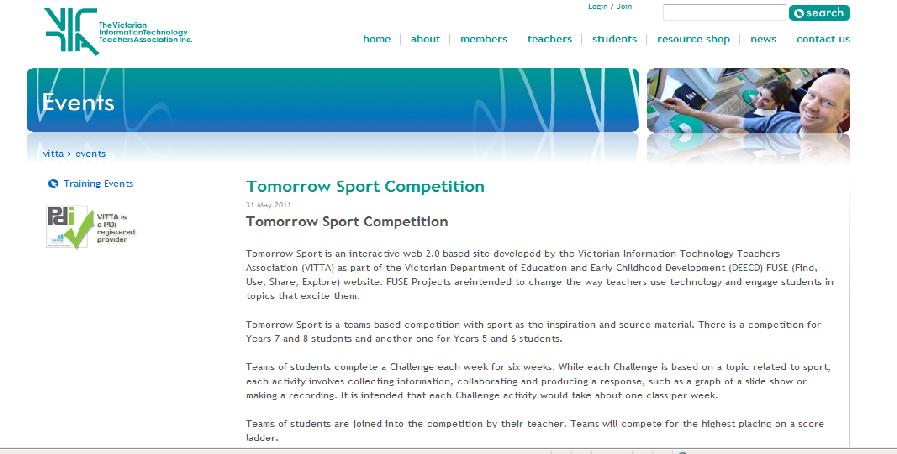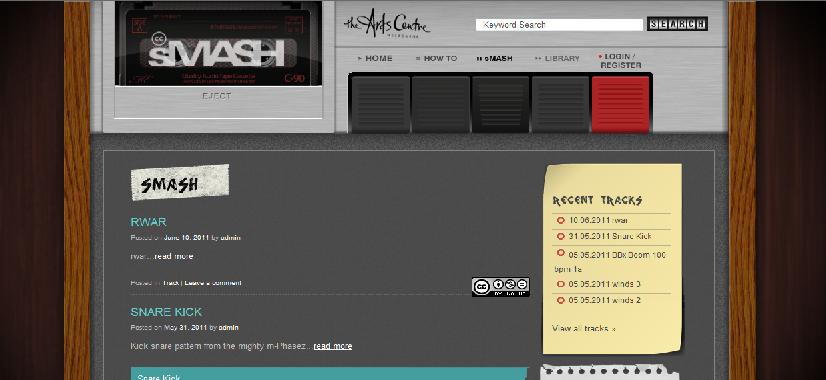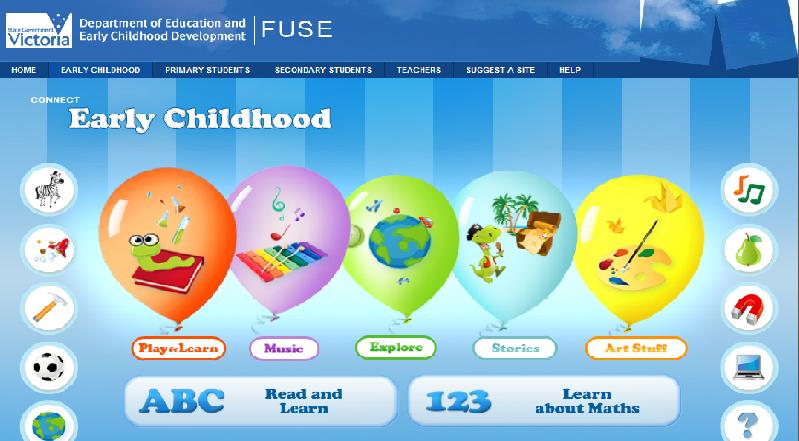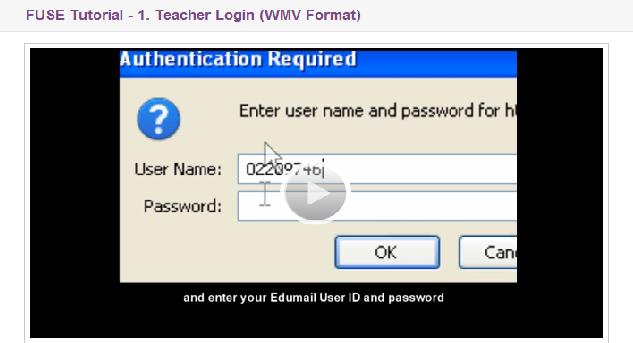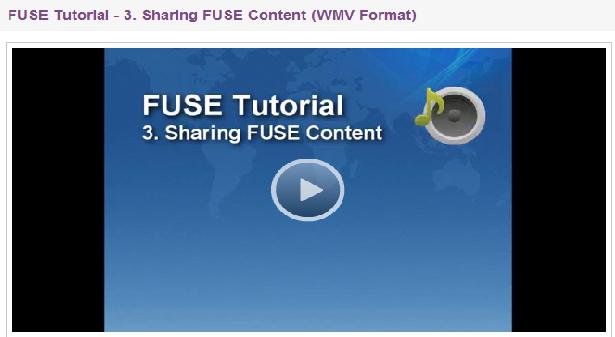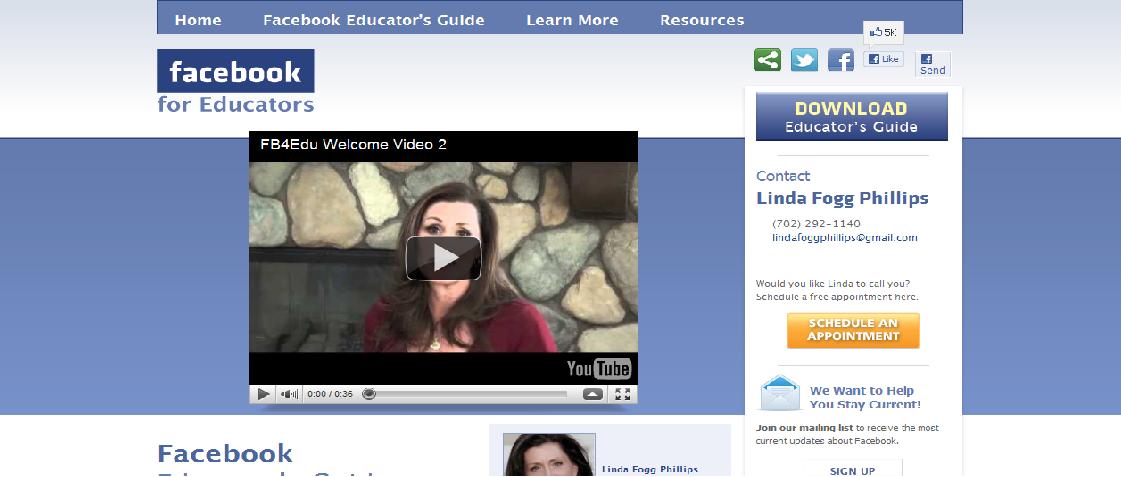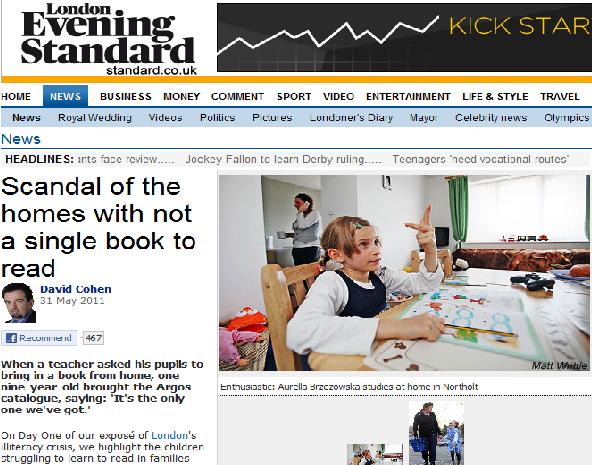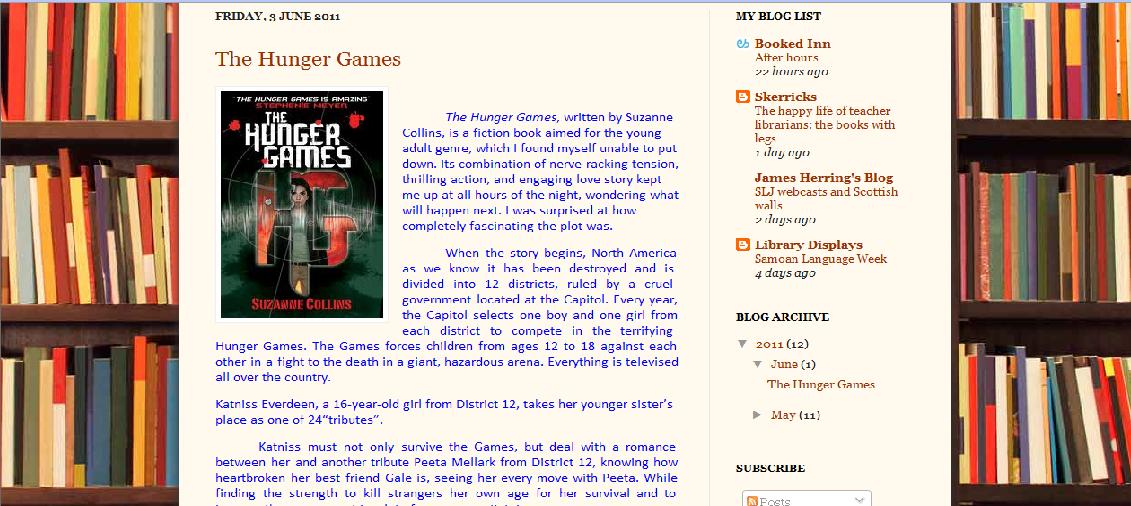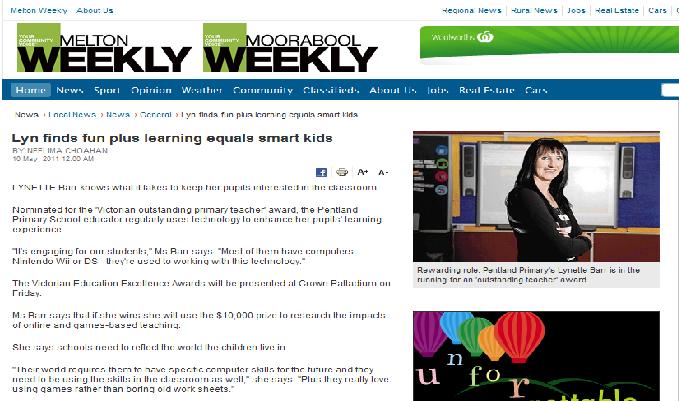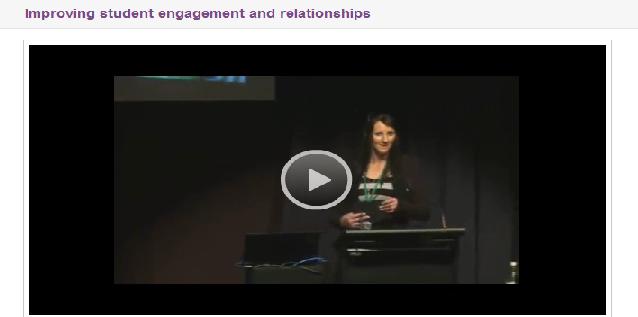Tomorrow Sport is a competition by Victorian Information Technology Teachers Association (VITTA), for primary schools (grades five and six) and secondary schools (years seven and eight). It is a team-based competition with sport as the inspiration and source material. The teams complete the challenge over a six week period (approximately one class per week), developing numeracy, literacy, social and personal development, citizenship, and collaborative and cooperative learning skills along the way. Each challenge involves collecting data from the activity and uploading a response to the Tomorrow Sport website. The first version is based on AFL, and the material you would be provided with includes links to curriculum standards and rubrics. If you are interested in being part of the competition, contact VITTA Project Officer Paul Wright (Paulw@vitta.org.au), and pass this information on to any teachers who may be interested, such as the PE staff.
Monthly Archives: June 2011
FUSE learning resource: CC sMash
CC sMash, created by The Arts Centre, will be released on August 18th and will allow students to create, attribute, and share their own audio work, while learning about using material correctly via the creative commons open license framework. The creative commons site provides a library of sound from which to create your mashups. This site is a must to show to your school’s music teachers and ICT teachers, who can start planning to bring their students plenty of fun mixed with learning.
FUSE learning resource: Making History: Research, Create and Share
Making History: Research, Create and Share is a resource that has been developed by Museum Victoria. The site provides teachers and students with the resources they need to research, plan, create and share community digital histories. This is a fantastic resource for a local history project or a family history assignment. As part of the resources and tools, you are given access to videos offering advice from experts such as historians and curators, and you have access to the forum. If you are not sure what to base an assignment on, there are a list of themes, which allow you to explore resources by topic, such as ‘Living with natural disasters’, ‘World events, local impacts’, and ‘Migration and cultural identity’.
FUSE (Find/Use/Share/Education)
FUSE is the DEECD’s (Department of Education and Early Childhood Development) centralised portal of online teaching and learning resources for Victorian schools. Teachers and students can search, share, and create learning experiences that use web 2.0 technologies.
All content on the site has been checked for unsuitable material, and is quality assured. The portal has search pages for Early Childhood, Primary Students, Secondary Students, and Teachers. They are appealing to their intended audience and are easy to navigate, such as the Early Childhood page below:
FUSE can be looked at and searched by anyone. However, if you are a Victorian teacher you can login to FUSE. Below is a video created by FUSE that explains the benefits of this:
By logging in, FUSE becomes a workspace where educators can create resource packages that their class, or anyone, can view 24/7. A resource package created for a particular assignment would have the assignment sheet, an assessment rubric, subject weblinks, and any other relevant material in it. Below is a video by FUSE that explains how to share the packages:
Selected organisations have created learning resources that are shared on FUSE. They are designed to connect students, teachers, and educational communities. The features of the new 2010-2011 resources include:
- ‘intuitive web based graphic interfaces
- blog and wiki spaces
- gaming and simulation scenarios
- social networking opportunities
- interactivity
- mobile and phone applicaitons
- virtual worlds’.
These resources are fantastic, and next week Bright ideas will be looking at some of the best of them.
Facebook for Educators
Facebook for Educators has been developed to provide educators with an overview of how to use Facebook effectively for teaching and learning, with a strong focus on safety and digital citizenship. The authors are professionals who have been asked by Facebook to be the bridge between the social networking tool and educators. The site covers everything from developing your school’s policy about Facebook use, to providing ideas for professional development, and suggesting communities where you can share your experiences of using Facebook in the classroom. Although the site has an agenda, they do a great job of reminding educators the need to embrace the learning styles of the 21st century student.
Miffy Farquharson and Bev Novak’s Prezi
Prezi is a zooming presentation application that allows you to show the connection between concepts as you zoom around the canvas. You are able to zoom in to focus on a piece of information, then zoom out to see the bigger picture. The prezi website provides a number of short videos that explain how to use the application.
Teacher librarians Miffy Farquharson and Bev Novak from Mentone Grammer (Mentone, Victoria) presented at the May SLAV conference Creative communication: A conference for library technicians and assistants on the topic ‘Social networking to publicise books’. To illustrate this talk, Miffy and Bev made a prezi. They have kindly allowed Bright Ideas viewers to see their prezi, and it is clear how effective a good prezi can be in conveying information and in capturing an audiences’ attention:
Thankyou Miffy and Bev, your prezi is fantastic. For those of us just starting to play with this application, your prezi shows us what is possible.
Worth reading – London’s illiteracy crisis
 London Evening Standard is running an expose on what they are terming as ‘London’s illiteracy crisis’. The below article is ‘Scandal of the homes with not a single book to read’ (31st May 2011), and examines why ‘one in four children leaves the capital’s state primaries unable to read properly’. Have a look at ‘Also on this topic’ at the bottom of the page for further reading.
London Evening Standard is running an expose on what they are terming as ‘London’s illiteracy crisis’. The below article is ‘Scandal of the homes with not a single book to read’ (31st May 2011), and examines why ‘one in four children leaves the capital’s state primaries unable to read properly’. Have a look at ‘Also on this topic’ at the bottom of the page for further reading.
Guest post: Barkly College Libraries: Connecting, encouraging, blogging
The staff of Barkly College Libraries have created a wonderful blog, Barkly College Libraries, to connect the Barkly District, the College, and the Libraries, and to foster a love of reading and learning. Shelagh Walsh, Library Technician at Barkly College Secondary, has been kind enough to write a guest post about the creation of the blog, and how it is being used to encourage learning in the community.
Barkly College Libraries have been asked to write a guest article for this amazing blog and we feel very privileged to do so.
To put us into perspective – we are situated in the middle of the Northern Territory – about 500kms north of Alice Springs and 1000kms south of Darwin. We are classed as a remote location, and because of this, we have many challenges that other suburban schools may not have. Our student base is majority indigenous with over half of these students being ESL (English as a Second Language) students. As you could appreciate, libraries and reading are not high on their agendas.
We wanted something that, we hoped, would catch their attention – and, it should be said, that of the staff as well. Something to make it easy to keep people updated with anything that was happening in the library – an easier way to promote books and to bring new books to everyone’s attention – something we could use to promote our college and the Libraries. Another aspect of the creation of our blog was the fact that we, ourselves, were interested in learning and using the Web 2.0 tools. This seemed a way of combining both wants or needs into one – so to speak. Having tossed the idea around for a while, we sought approval from the Director of the College to go ahead.
After that, came the fun part. We started by researching a number of Library Blogs to get an idea of what others had done and what hosting site they were using. It appeared that Blogspot seemed to be the most commonly used, and was an attractive layout as well.
To give you an idea of the ease of setting up the blog – we did it in an afternoon at home with a laptop – while bathing my dogs. It was a snap. The hardest part was the first post – blank looks at each other – now we are here what do we want to say?
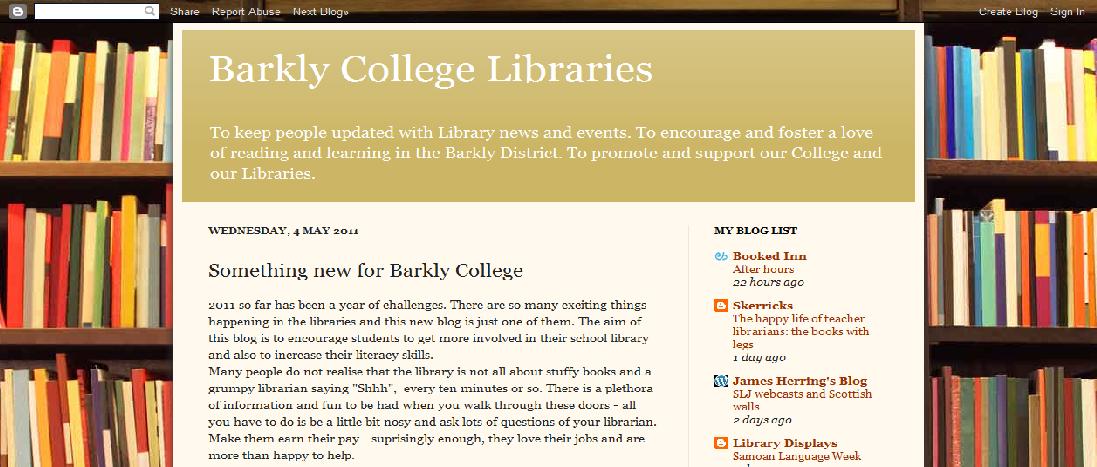
Our aims are simple – we want our students and staff to know what is happening in the Library world – and importantly, to feel a part of it. We are campaigning for book reviews by students – whether by themselves or as part of a class. Our kids love trivia and all that sort of thing, and so the Worthless Wisdom post was conceived. We have asked them for suggestions as well – if they feel an ownership, then hopefully they will use it. Currently there is an article posted from one of the year 7 classes after we spent a lesson showing them how a library works and how to find things. More lessons will involve research skills and evaluating websites. We have developed various ‘games’ and activities to get the message across without lots of talking and writing as we are an Indigenous ESL school and this seems to work well.
We are fairly passionate about reading and books and, I believe, have been reasonably successful in getting kids and books together, especially the senior students. So somewhere to review books, to be able to comment and discuss the books they had read seemed to be worth a try. Get them reading, we are halfway to getting them into learning as well was our thought – and if they don’t realise it is a sneaky attack on the flank, so much the better!
It is early days yet and we know that it is going to take a lot of effort and promotion to get this running the way we envisage. Setting up the blog is the easy part – it is getting everyone on board and using it, along with keeping it continually up to date with interesting posts that will keep us on our toes. But we are optimistic that it will become an important part of our schools – and meanwhile we, ourselves are learning lots and having fun. Who could ask for more than that?
I really didn’t realize that librarians were, you know, such a dangerous group … They are subversive. You think they’re just sitting at the desk, all quiet and everything. They’re like plotting the revolution, man. I wouldn’t mess with them.”
Michael Moore.
Thankyou, Shelagh, for this wonderful look at how you are using a web 2.0 tool to foster learning, and well done to you and the Barkly College Libraries team on your great blog.
Worth reading – ‘Librarian positions cut…’
 ‘Librarian positions cut in schools across the country’, published by HuffPost Education (last updated 1st June 2011), is a look at the struggle teacher librarians in the USA face to hold onto their profession. Australian teacher librarians are circulating the article (e.g. I found it from Tony Ogden on OZTL_NET). It is scary to think how ignorant many are of the role of the teacher librarian in the school community, that they can make these positions redundant.
‘Librarian positions cut in schools across the country’, published by HuffPost Education (last updated 1st June 2011), is a look at the struggle teacher librarians in the USA face to hold onto their profession. Australian teacher librarians are circulating the article (e.g. I found it from Tony Ogden on OZTL_NET). It is scary to think how ignorant many are of the role of the teacher librarian in the school community, that they can make these positions redundant.
Worth reading – ‘Lyn finds fun plus learning equals smart kids’
 ‘Lyn finds fun plus learning equals smart kids’ is an interview by the Melton Weekly with the inspirational 2011 Victoria Teachers Credit Union Outstanding Primary Teacher Award Winner, Lynette Barr. Lynette is a teacher at Rosyln Primary School and uses 3D games to provide engaging, authentic learning experiences for her students. Lynette explains how teaching needs to reflect the needs of the students:
‘Lyn finds fun plus learning equals smart kids’ is an interview by the Melton Weekly with the inspirational 2011 Victoria Teachers Credit Union Outstanding Primary Teacher Award Winner, Lynette Barr. Lynette is a teacher at Rosyln Primary School and uses 3D games to provide engaging, authentic learning experiences for her students. Lynette explains how teaching needs to reflect the needs of the students:
You can also view Lynette’s presentation ‘Improving student engagement and relationships’, that was part of the 2010 Innovation Showcase, below:

